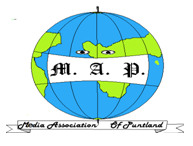On this International Day for Universal Access to Information, the Media Association of Puntland (MAP) underscores the vital importance of transparency in governance and how it influences the safety of journalists in Somalia.
In Somalia where press freedom is fragile, mainstreaming Access to Information and public participation is essential not only for empowering citizens but also for protecting the journalists who inform them.
Mohamed Dahir, Chair of MAP, emphasized the importance of access to information and the protection of journalists, stating, “Without transparency and access to government-held information, journalists are left vulnerable, often forced to take unnecessary risks to uncover the truth. Ensuring that both the public and media have access to information is not just about empowering democracy—it’s about protecting the very people who strive to keep it alive.”
Although individuals enjoy some freedom of expression in more secure regions, criticism of powerful figures—whether within the state or society—can provoke dangerous reprisals. Journalists and citizens alike face significant risks for engaging in sensitive political discourse, with social media posts being subject to criminal punishment.
In some regions open debate is nearly impossible, with severe restrictions on free expression and media activity by powerful political influencers or armed groups.
This harsh reality underscores the importance of institutional access to information, as it reduces the risks journalists face when gathering news from unsafe or unofficial sources.

Despite the provisional constitution’s call for freedom of the press, Somali journalists continue to face harassment, arbitrary detention, suspension, fines, and violence from both state and non-state actors.
These figures seen in the chart on the left highlight the dangers Somali journalists face daily, especially those where reporting can lead to serious consequences. Unlike many other regions in Somalia, Puntland state has experienced a notable degree of calm over the past two years. There were no reported arrests of journalists. This stability reflects Puntland’s commitment to press freedom. However, threats to freedom of expression persist.
A significant incident occurred on June 20, 2022, when opposition groups resorted to violence in response to the government’s local democratization efforts. Journalists covering this unrest faced considerable risks, underscoring the ongoing challenges to media freedom, even in comparatively stable areas. MAP welcomes the recent progress made in collaboration with Puntland authorities towards enacting the Access to Information Act.
After a year and a half of advocacy from MAP, the government has finally responded by prioritizing this important legislation outlined in Article 3 of the state media law. We urge the Puntland government to expedite the approval and publication of the draft Act agreed upon in September 2024.
The Access to Information Act is seen by MAP as a vital instrument for addressing these challenges. By guaranteeing public access to government-held information, the Act promotes transparency and accountability while mitigating the risks associated with investigative journalism.
Ibrahim Abdirahman, MAP Programs Manager, emphasized its importance, stating, “This legislation is a crucial step towards fostering a culture of accountability and openness. However, it is equally essential to ensure that those reporting on sensitive issues are safeguarded from harassment and violence. A collaborative effort among all stakeholders—government, civil society, and international partners—is necessary to create a safer environment for our journalists.”
Despite these advancements, concerns persist regarding the misuse of regulatory bodies, such as the Somali Media Council.
Federal authorities have employed these bodies to exert control over independent journalism through a flawed and exclusionary selection process, undermining press independence and jeopardizing the safety and freedom of journalists.
In conclusion, mainstreaming access to information not only empowers citizens but is also pivotal in enhancing journalist safety. By fostering transparency and reducing reliance on hazardous news-gathering practices, Somalia can cultivate a safer, more accountable environment where the media can operate freely.
END

